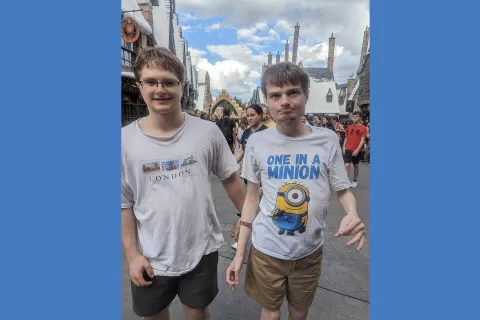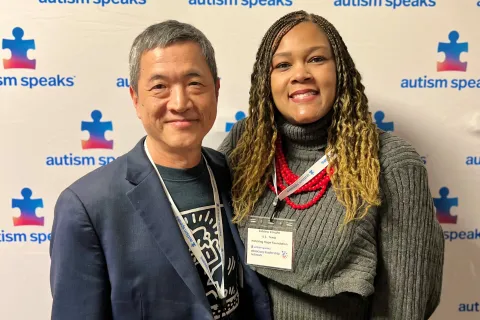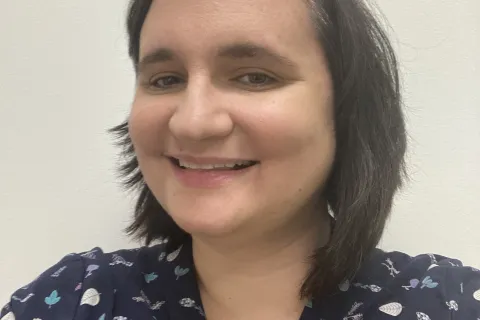Parent gains knowledge through Family ECHO sessions
Karla gained knowledge and community through Family ECHO: Autism
Before her son Michael Paul (or “Paulie”) was diagnosed with autism between age 7 and 8, Karla B. struggled to find a community that felt like a good fit for their family. Paulie has other diagnoses that made it difficult to recognize his autism symptoms, delaying his access to needed interventions and supports.
In her search for community, information and guidance, Karla found Family ECHO: Autism. Family ECHO is a training series organized by Nationwide Children’s Hospital, an Autism Care Network site, and supported in part by Autism Speaks with the goal of helping families build the skills they need to better care for their autistic children.
Karla shares how the Family ECHO sessions helped her understand Paulie and develop strategies to help him learn and grow.
Q: What is your relationship with autism? Can you tell me about your son’s autism journey?
Our 12-year-old son has a diagnosis of ASD. The journey has been a slow one. We did not get the official diagnosis until he was about 7 to 8 years old, and even with the diagnosis, it was hard to grasp. Our son has other diagnoses that have blurred the lines for us, including premature birth, cerebral palsy, hard of hearing, visual impairment and seizure disorder. What we thought were sensory and behavioral differences from his other diagnoses are also characteristics of ASD.
Before Paulie was diagnosed with autism, we felt like we did not fit into any community. In time, our son could walk, so he did not have the movement problems of cerebral palsy and that community no longer felt like a good fit. He was not “just” hard of hearing, so we did not fit into the community in his school for the deaf. ASD is a giant umbrella where we finally felt that we could fit and get the help and answers we needed.
Over the years, we read about and acknowledged that Paulie had autistic characteristics, but we did not realize it may be one of his diagnoses. I wish we had figured it out sooner. We may have understood better when his therapists tried to show us alternative ways to teach, care, communicate and approach his behaviors. Instead, we thought that with time, things would get better or he would come to understand our ways of behaving and interacting with the world.
Q: How did you discover Family ECHO: Autism and what led you to participate in the sessions?
I discovered Family ECHO from a post on a local autism chat on the Slack app called “Autism Delaware.” It provides parents with peer-to-peer support, and the information they provided about ECHO was a great resource!
We have been struggling as a family with behavioral problems (especially with COVID and school being out). I have been looking for any information or guidance that may help us as a family. I have dragged my feet in getting into ABA, and to be honest, the process and the waiting time has made the whole idea a little defeating. It’s hard to get emails and phone calls returned. There are long applications. I know they are necessary, but when you are trying to survive your day-to-day, work and care for the family, it is overwhelming.
In the meantime, I have been trying to find information and guidance however I can get my hands on it. Family ECHO sounded perfect.
Q: What do you consider the biggest benefits of participating in this program?
The biggest benefit of participating is the ability to learn from experts all over the U.S. who have different roles managing and caring for children with ASD. Becoming more understanding of ASD from a behavioral and educational standpoint has helped our family to communicate and understand our son more. We have come to understand how he sees and processes the world.
I have enjoyed the feedback from other parents during the case presentations as well. It lets you know that you are not alone in this and there are others who are having the same experiences as you.
Q: Which Family ECHO sessions have you found the most valuable?
I have really enjoyed them all. One of the first sessions on discipline really opened my eyes to some of the things we do as parents that make it harder for our children to understand how to behave. We give them mixed signals, often starting off strong with our discipline and saying no to something but then giving in when we get tired. This has taught our children that if they continue to ask or pester, they will get what they want. We already knew this, but to hear it and see the alternative ways to discipline have been helpful—not just for our son with ASD but our other son who has learning differences as well.
Q: Would you recommend Family ECHO to other family members of people with autism?
Absolutely. I actually have through the peer-to-peer chat app I am part of. The lessons have been so helpful, and the fact that they are available to watch again is wonderful! I listen to them live in my car on my commute home, so it is nice to have them available later since I miss parts and I can‘t see the visuals while driving. I plan to also share them with my husband.
Learn more:
- Learn more about Family ECHO: Autism and its impact on the autism community
- If you have questions or need help connecting to autism services, resources and supports in your community, contact the Autism Response Team (ART)
- Sign up for My Autism Guide to access content and resources customized to your age, location and level of need








